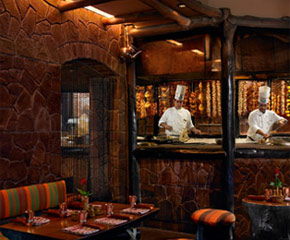Former US President Bill Clinton, Britain’s Tony Blair and Afghanistan’s President Hamid Karzai are among the many illustrious diners who have trooped to Bukhara for its succulent wood-fire cooked meats and buttery lentils which have been made the same way for almost 30 years.
Gourmet bible Restaurant magazine has rated Bukhara as Asia’s best restaurant for the past two years.
The menu, engraved into wood, has not changed in the past 28 years and its famous tandoori chicken – marinated in yoghurt, tamarind and spices and cooked in a clay oven – continues to draw hordes of devotees.
In the wood-panelled interior of Bukhara, the botany-trained chef spoke about why staying the same is not a bad thing.
Q: Will you change the Bukhara menu?
A: I’m proud to say that we are quite contrary to the global trend of changing the menu once or twice a year. We have tried and maintained the menu for the past 28 years and we are still going strong. The kebabs we have here are the “mother kebabs” and all others derive from it, so there’s no point in adding more.
Q: What is your cooking philosophy?
A: We believe to keep the menu short and crisp and maintaining the quality of the top-most order. By having a very vast menu, you can’t control the processes with it. The specification of sizes is well maintained at Bukhara. A whole leg of lamb that comes to us will be between 1.2 kgs to 1.5 kgs. Our own company breeds the jumbo prawns we use, ensuring they are between 80 grams to 120 grams. It’s that sort of precision that ensures quality.
Q: You have had many famous people eat at your restaurant, any special requests?
A: After Bill Clinton had his heart bypass, he came to Bukhara two or three times. He had to be careful of the lamb because red meat is not too good for heart patients, so he preferred fish or chicken after that.
Q: How do you prepare your famous dal (lentils)?
A: Our dal is top selling and we even vacuum pack it to sell it all over India. A lot of delicacy goes into cooking it. The dal is boiled overnight and the next morning we remove the scum and the dirty water, put in the spices and keep it over the fire to cook. Anyone who passes it gives it a stir.
Q: What is the biggest misunderstanding about Indian food?
A: That it is all about curries and it’s all about being spicy. India is a very vast country with plenty of spice. But the food habits change from one extreme of the country to the other.
Q: Since you are trained in the study of plants, how do you think that has helped you in the kitchen?
A: You understand the different plants, you know what vegetables to use, how to prepare them and which ones are best for cooking. Right from my childhood I was interested in cooking. I would always spend time in the kitchen whenever I’m free. I was initially trying to get into medicine but I had some inclination towards cooking so I decided to make a career out of it.

